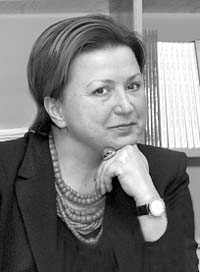In Search of a Fatherland

Where is Ukrainian journalism going? On the face of it, the answer to this question appears quite simple. It should move toward self-identification. However, so far it seems to be in some kind of chaotic Brownian movement. Many complain that we lack the necessary sense of fraternity. To change the situation, we need to adopt some professional and moral frame of reference. What kind of framework this should be is a subject for separate discussion. However, beyond doubt, we cannot do without some criteria. In every specific case it is important to start with not simply defining what is good and bad but from what standpoint we cover it and why we treat it the way we do. For example, there is a fair phrase about politicians: before going into politics, find your country. If somebody thinks this phrase is far from reality, it is very easy to prove it precisely on Ukrainian ground.
Our parliament recently held hearings on the Holodomor Manmade Famine. I think there is no decent person who, having familiarized him or herself with materials on what the 1921-1923, 1932-1933, and 1946-47 famines meant to Ukrainians, could fail to understand how right The Day’s consultant Professor Mace has been in pointing out that we should see ourselves as a post-genocidal society — a society that lived through the cruelest of trials that have probably affected the nation even on the level of its genes. When Communist deputies tried to sabotage the hearings by demonstratively leaving the meeting hall, our newspaper was the only one to say openly and maybe even categorically as never before that this is ignorance and shame. Far from all our politicians have chosen what country they belong to. Ukraine’s problems do not bother them. This is why such things happen.
But have Ukrainian journalists chosen their country? They like to call themselves the watchdogs of democracy. But first you have to have something to watch. There is still no answer to a quite elementary concrete question: Did they choose the system of values they seek to protect? Did they choose their place, their country? A simple example is that when Ukraine was conferred with the status of the EU’s new neighbor and it finally became clear that we would not get European Union membership in the immediate future, some internet publications, especially those considering themselves in opposition, wrote mockingly, “The EU has finally closed its door on Ukraine.” Of course one has every right to dislike Ukraine’s authorities and officials, but it is not quite appropriate to write in such terms about one’s own country.
Another example: the reports on St. Petersburg’s 300th anniversary recently broadcast by all Ukraine’s television channels were all full of the enthusiasm of being involved in a great event. I have yet to see in these reports any Ukrainian intonation or Ukrainian viewpoint on what was happening, save for a bombastic and incorrect remark in one of the reports on Leonid Kuchma acting pragmatically and using the holiday as an opportunity to meet his colleagues. Such an affectation is ill-advised and unfair to the president. First, if we look at it realistically, it was not all that pragmatic of the president to use his chance but that a situation arose after recent problems that allowed him to communicate with Premiers SchrЪder, Blair, and others. Second, he is not the only pragmatic world leader there. As a rule, all heads of states use holidays to solve unofficially problems that could otherwise cause many problems in terms of protocol. But still, this is not the main thing. Even if journalists were simply lazy and did not want to make any effort, had they even a slight feeling of being part of Ukraine could use, for example, The Day’s materials on Ukraine’s contribution to St. Petersburg’s history (the more so that the president used his chance to meet Ukrainian community in St. Petersburg {and it was in St. Petersburg that, within a few days of the abdication of the last tsar, the head of the local Ukrainian community, one Prof. Tuhan- Baranovsky, was able to organize a thousand Ukrainians to demonstrate in the streets for the rights of Ukraine — Consultant}). The fact that such things fail to happen now is but more evidence of the lack of a sense of professional solidarity within the journalistic community, which is still infected with such anachronistic instincts and diseases as petty jealousy, piddling intrigues, suppression, and unfair competition. This prevents them from understanding where they should boldly quote each other, or exchange information to become a united community and journalists of the same country, Ukraine. And if we try in this context to summarize the results of answering the seemingly simple question of where Ukraine’s journalism is going, first we need to answer another question of where our journalists have the will to move at all. Do they have the power to move consciously? To move on, one needs to define which direction we select as the priority for our movement.
Speaking of the Day of Journalists that we marked on Friday, we still have to master what we are all about. To turn it into a really our own day, we have to feel that Ukrainian journalism is developing, that our society has worked out some kind of demand for quality journalism. Meanwhile, if this holiday is to make any sense, it is that we should thank once again those who were our teachers in this profession, those who extended us their helping hand. I thank you.






